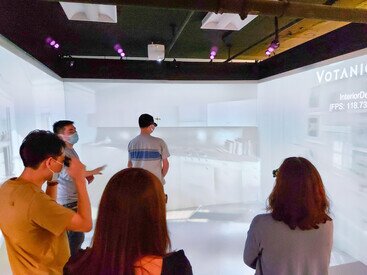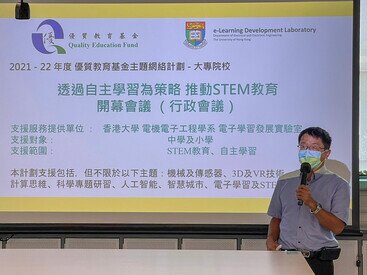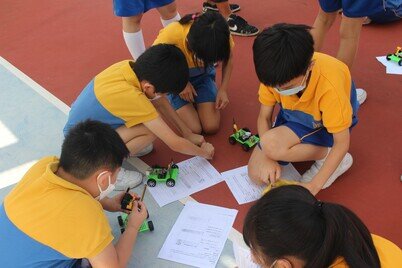Full STEAM Ahead for Engineering Team
“As a university teacher of engineering, I think one of our missions is to promote the use of technologies and also inspire more students to study these subjects,” Dr. Wilton Fok said.
Technology has developed at an eye-watering pace over the past decade, which is exciting but also challenging for educators. The technology is often new to schoolteachers, who must figure out what is essential for their students’ future study and work and how to deliver this content.
Into that breach has stepped Dr. Wilton Fok Wai-tung of the eLearning Development Laboratory of the Department of Electrical and Electronic Engineering, who has devised and delivered hundreds of training programmes to schools in science, technology, engineering, arts and mathematics (STEAM) education that have benefited thousands of primary and secondary school teachers and students in Hong Kong.
“As a university teacher of engineering, I think one of our missions is to promote the use of technologies and also inspire more students to study these subjects,” Dr. Fok said. In fact, admissions and applications in engineering have been on the rise in recent years, coinciding with his outreach programme.
Dr. Fok’s first milestone in this field was in 2014, when he was selected by the Education Bureau to develop e-textbooks for primary and secondary schools and won an HKU KE Award for his work. Since then, he and his team have developed a strong e-learning platform, curriculum, training workshops and materials on new technologies for local schools.
In 2019, for example, they received a major grant under the Quality Education Fund Thematic Networks – Tertiary Institutes grant to develop a project called Self-directed Learning as a Strategy to Promote STEAM Education. The aim is to cultivate teachers’ and students’ all-round abilities in science and technology by taking them through the engineering process and inspire them to develop a sense of achievement and self-esteem, from planning and materials development to teacher training workshops to sharing experiences with other schools. The project also organises project competitions and advises schools on hardware and software.
Schools in the programme can choose from among 10 major themes, such as robotics, artificial intelligence (AI) and big data, smart city, 3D tech, or art and Chinese culture – demonstrating that new technology can apply across all subject areas. Ms Alice Ma, the Project Manager assisting Dr. Fok on this project, cited one school that integrated technology into Chinese history, using 3D printing to print replicas of historical artefacts. “Schools can decide their own technology priorities. Our job is to share our expertise, inspire them, and teach the teachers so the latest technologies can be learned by the next generation,” she said.
The experience built up over the past decade means Dr. Fok and his team have been well-prepared to take on today’s biggest development, which is AI. They have just been commissioned by the Education Bureau for a three-year project to develop an AI-focused e-learning platform and knowledge management system. The aim is to combine the natural language processing of an application like ChatGPT with curriculum knowledge to be a personalised tutor for each student.
The project gets underway in September and more than 60 schools have confirmed their participation so far. Apart from technological know-how, the project also features a strong ethical component.
“We know that AI is a wave that we cannot resist, like it or not the next generation will be using it. So why not teach students earlier how to make use of AI so they can learn and work better, and use it in a more ethical way?” Dr. Fok said. “We have set up ethical and professional committees on AI with some industry experts to help govern and provide guidelines on making use of AI in education.”
Mr. Kelvin Chun, another Manager in the lab, added: “Ethical issues including bias in training data, privacy of data sources, and transparency and accountability for model training are concerns for the AI impact in education.”
Dr. Fok expects the project itself to have significant impacts due to its duration and reach. “The timeframe of the impact will be very long and wide because we are inspiring young generations to contribute to society with new inventions,” he said.





